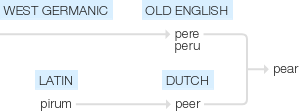Pear
Old English pere, peru, of West Germanic origin; related to Dutch peer, from Latin pirum .
wiktionary
From Middle English pere, from Old English pere, from Proto-West Germanic *peru, from Vulgar Latin *pira, originally the plural of Latin pirum but reconstrued as a feminine singular. Cognate with Saterland Frisian Peere(“pear”), Dutch peer(“pear”), Danish pære(“pear”), French poire(“pear”), German Birne(“pear”), Icelandic pera(“pear”), Swedish päron(“pear”).
etymonline
pear (n.)
Middle English pere, from Old English pere, peru "fruit of the pear tree," common West Germanic (Middle Dutch, Middle Low German pere, Old High German pira, bira, Dutch peer), from Vulgar Latin *pera, variant of Latin pira, plural (taken for fem. singular) of pirum "pear," a loan word from an unknown source, perhaps Semitic or a lost Mediterranean language. It likely shares an origin with Greek apion "pear," apios "pear tree." Their cultivation began as much as 3,000 years ago.
